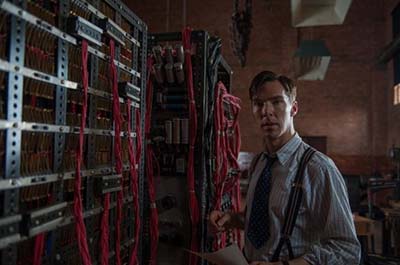 Alan Turing has been having a belated comeback in the same style as Tesla, except, I think Turing’s accomplishments are more verifiable now that much of Enigma and Ultra have been declassified. Modern computers can blow away whatever the participants of WWII had. This is another instance like Argo in which I need to find a book to see what Hollywood modified to make the narrative more interesting.
Alan Turing has been having a belated comeback in the same style as Tesla, except, I think Turing’s accomplishments are more verifiable now that much of Enigma and Ultra have been declassified. Modern computers can blow away whatever the participants of WWII had. This is another instance like Argo in which I need to find a book to see what Hollywood modified to make the narrative more interesting.
Imitation begins with police detective Nock investigating a burglary in the early Fifties. The victim oddly doesn’t want to press charges and claims he doesn’t know who did it. This befuddles Nock until he discovers who the aggrieved is…Dr. Alan Turing, a resident math (or maths in the UK) professor at the city’s university. The detective is very tenacious since none of the electronics were stolen. When there’s also a gap in Turing’s background during the war and the Ministry of Defense tells Nock to go away. After a younger man is arrested for male prostitution can the police bring in Turing for questioning; the prostitute said he was solicited by Turing recently.
During the questioning, Turing tells Nock he worked in a radio factory through the war. Nock isn’t convinced so Turing explains his famous sentience game for determining whether or not machines (eventually computers) are masquerading as people. Then Turing tells the truth about the Ultra Project and how he participated in cracking the Nazis’ Enigma machine.
The movie proceeds to hop around in time afterwards. The “present” day Fifties, the opening years of WWII and Turing’s school years in the Twenties. I’ll focus on the War period. A small group composed of mathematicians and linguists are hired by the War Department to decode how the Enigma machine works. It’s a frustrating device with millions of combinations that the enemy resets every day at midnight London time. Ergo, every morning the team has to start over. Being a mathematician, Turing deduces (correctly) how to defeat Enigma. Build a WWII version of a computer which can work through the combinations faster than a human. There are several obstacles to Turing’s solution: cost (£100,000, about $4 million today), he isn’t in charge and no one else on the team likes him (Cumberbatch portrays him with Asperger syndrome). After writing a letter to Churchill, Turing gets his wish to be in charge. First order of business, he fires two people he deems incompetent. Next, building Enigma’s foe (Christopher). Finally, finding new people with the aptitude to solving the problem; Turing uses a crossword puzzle in a newspaper to recruit them.
We all know how history played out. Enigma is eventually defeated. The UK uses Ultra to intermittently tip the Allies about Axis positions; too much and the Nazis will change how Enigma operated. The war ends favorably or else I probably wouldn’t be writing this. About a decade later, Turing is arrested for homosexuality, accepts hormone therapy over prison and eventually commits suicide.
In the acting department, the cast does a great job. No hamming it up, no overacting, I found it to be on par with the better BBC dramas. A round of applause to Keira Knightley as the only woman on the team, Joan Clarke. She’s a strong, competent woman who was incredible at math and allegedly someone Turing respected. I stumbled upon some crummy Web article listed her in the company of actresses who can’t act (Courtney Love, Lindsay Lohan). I think the author put her on said list because Keira doesn’t get Hollywood-esque enhancements a la Megan Fox (blech!). Personally, I can’t think of a movie I’ve seen her in I disliked due to her acting. The other person is in a supporting role, Mark Strong as the MI6 minder. It was good to see him playing a non-exaggerated villain (Sherlock Holmes, Kick Ass).
The history buff in me does take issue with how vital the UK’s efforts were. Intelligence advantages aside, the Axis was doomed once the US entered the fray. My nation’s resources were a huge injection to turn the tide. Maybe the war would’ve dragged out a couple more years but I doubt it. Hitler became a liability to the Axis command so he indirectly contributed to our victory. Next, the UK wasn’t going to starve to death. Churchill might have when they ran out of booze and cigars but not the citizenry. While German submarines began to tighten the noose around Great Britain, scientists researched how many calories a day all the residents would need to function alongside what the nation’s agricultural output was. The outcome? UK agriculture could do it. The diet would be bland yet no one would be malnourished just like their cuisine has always been! Rimshot!
Alamo Extras: American WWII Propaganda cartoons to get people to buy war bonds; an Alamo quiz to find the hidden message; a How-To movie for intelligence offices on altering messages via word choices, changing the word order and removing punctuation before encryption, I’m guessing slang would confuse the enemy further; British comedy bits on how WWII spy craft worked; and a stop-motion cartoon ridiculing Hitler.
